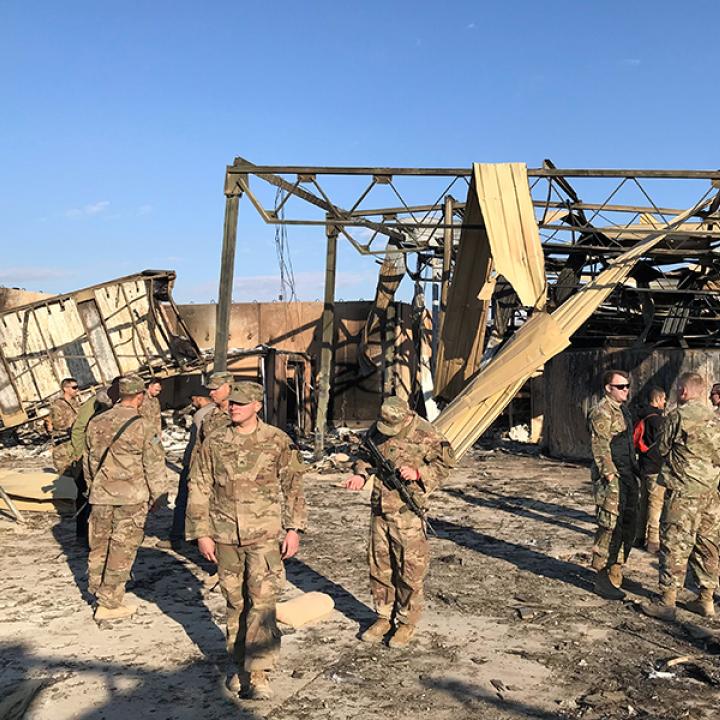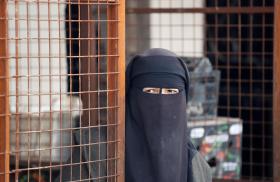

The risky tit-for-tat strikes between U.S. and militia forces are one symptom of a wider competition between rival actors in Iraq—one that American and European officials should work together on containing.
Earlier today, an AC-130 gunship reportedly struck Iraqi militia elements near Baghdad after U.S. forces at al-Asad Air Base came under attack, the latest in a series of exchanges since war erupted in Gaza. Both the Biden administration and Iran-backed militias have deliberately limited the scope and lethality of their strikes thus far, and today’s salvo likewise seems aimed at messaging and deterring rather than escalating. Yet the situation still holds significant risk of exploding into something more, whether intentionally or due to errant fire or other miscalculations. The near-daily attacks also highlight the complex domestic political dynamics behind Iraqi responses to the Hamas-Israel war, with many competing actors seeking to exploit the conflict in a way that advances their standing without jeopardizing the power and income they have already acquired.
Reasons for Militia Restraint
Numerous Shia militias are part of the current Iraqi government—a status they reached after years of using their guns, their patronage from the Shia regime in Iran, and their record on fighting the Sunni jihadist forces of the Islamic State to obtain government seats. As with most other Shia militias in the Middle East, they have declared themselves part of Iran’s anti-American, anti-Israeli “axis of resistance,” recently rebranded under the local umbrella name “The Islamic Resistance of Iraq” (a rebranding that, not coincidentally, gives their formal parent organization—the Popular Mobilization Forces, an official Iraqi state organ—more protection from sanctions and legal actions). Since October 18—the day after an explosion at Gaza’s al-Ahli Hospital spread outrage throughout the Arab world—members of the “resistance” have carried out more than sixty drone, rocket, and missile attacks against U.S. targets in Iraq and Syria, including a roadside bombing against a coalition convoy. (For a comprehensive list of these attacks, see The Washington Institute’s regularly updated strike tracker, a product of Militia Spotlight.)
Yet Iraqi militias also have good reason to show restraint. Like their Lebanese ally, Hezbollah, they have become dominant players in the country’s politics, and a full-scale war with the United States would jeopardize their grip on power. Hence, they typically prefer to keep their military activity (if not their rhetoric) against American interests either quiescent or at a low simmer while they continue entrenching themselves in the state and reaping the benefits it provides. This logic long guided the Iran-backed Badr Brigades (rebranded as the Badr Organization) and now seems to apply to Asaib Ahl al-Haq (AAH), one of Iraq’s most radical and politically powerful militias. But not all Iran-backed groups share this view. Most prominently, the U.S.-designated militias Kataib Hezbollah and Kataib Sayyid al-Shuhada believe that attacking American targets more frequently is an effective way to gain an edge over their rivals—though they too are careful about calibrating the intensity and timing of their actions to avoid major retaliation.
Militia restraint also stems from the fact that Shia religious leader Grand Ayatollah Ali al-Sistani did not urge armed action when publicly declaring his support for Palestinians on October 11. He is still highly revered by the militias, even though some of them are more likely to follow the diktats of Iranian Supreme Leader Ali Khamenei.
Moreover, relations between Palestinians in Iraq and pro-Iran militias have a complex and often contentious history, raising questions about the latter’s willingness to take risks for the wider Palestinian cause. The progenitors of today’s militias harassed and attacked Palestinian refugees in the past, seeing them as loyalists to Saddam Hussein. Between 2003 and 2008, the local Palestinian population dropped from 34,000 to about 9,000, partly reflecting this violence.
Reasons for Alarm
The greatest risk of a full-blown Iraqi front lies in the domestic rivalries between Shia groups—not only pro-Iran factions, but also the populist movement headed by Muqtada al-Sadr. Unlike in Lebanon, Iraq’s pro-Iran factions lack a clear leader and have increasingly splintered since 2020, when a U.S. strike killed militia chief Abu Mahdi al-Muhandis and his Iranian handler, Maj. Gen. Qasem Soleimani of the Islamic Revolutionary Guard Corps-Qods Force. Today, many of these factions hold key posts in the government of Prime Minister Mohammed Shia al-Sudani. Yet various newer, smaller groups want more power and resources, envying AAH’s rise from a radical armed group to a key political player.
As noted above, these rivalries periodically lead certain groups to carry out more attacks on U.S. targets, and even if the perpetrators do not intend to kill Americans, slip-ups are an ever-present danger. In December 2019, for example, an American was killed by a militia strike on a base in Kirkuk, leading to the cycle of escalation that ended with the United States killing Soleimani and Iran firing missiles at Iraq.
Sadr is another key actor in this competition, which was already heating up before the Gaza war due to Iraq’s upcoming December 18 provincial elections. The raucous cleric has long relied on anti-Israeli and anti-American sentiment for political gain. In 2022, for example, his movement pushed to reinforce an existing anti-normalization law by imposing the death penalty on Iraqis found guilty of “collaborating with Israel.”
The current crisis has prompted a comeback of sorts for Sadr, who withdrew from the political scene last year after he won a plurality of seats in parliament but failed to form a government. He remains the only national figure to lead a mass political movement, and he often uses this public sway to issue maximalist demands—more to embarrass Sudani’s government and challenge radical groups on their own ideological turf than to actualize these demands. For instance, he has repeatedly called for an end to the U.S. military presence and the closure of the American embassy, even asking his supporters to take to the streets amid Secretary of State Antony Blinken’s November 5 visit to Iraq. Both he and the militia leadership also issued separate calls for mass protests last month near the border with Jordan, meaning “as close to Israel as possible.” Sadr’s followers did gather a large crowd; the militias, not so much (though both apparently achieved their side goal of unnerving Amman). Previously, Sadr’s followers stormed the Swedish embassy this summer to protest a Quran burning incident in Stockholm, essentially bullying Sudani’s government into saving face by expelling the Swedish ambassador.
Indeed, in this environment of factions trying to “out-radical” each other, the pro-Iran establishment governing the country may have no choice but to adopt tougher rhetoric. On October 30, Hadi al-Ameri of the Badr Organization issued a statement calling for the withdrawal of the global coalition against the Islamic State, contending that the threat no longer justified a foreign military presence. Although such statements may not lead to any practical steps by the government, they could create a more permissive environment for anti-Western violence.
Policy Implications
The Biden administration has taken a mixed approach to the current upsurge in militia attacks. Prior to today’s AC-130 strike near Baghdad, each of Washington’s responses to attacks on U.S. facilities occurred in Syria, not Iraq, in line with the administration’s desire to avoid destabilizing a U.S. partner. This approach mirrored the militias’ own strategy—realizing the higher stakes of conducting attacks at home, they have focused most of their recent strikes in Syria, where they are far more keen on actually bringing about a U.S. withdrawal.
On November 17, the United States issued new sanctions against Kataib Sayyid al-Shuhada and several Kataib Hezbollah figures, in a largely symbolic move that was widely anticipated after weeks of attacks. Besides sending a pointed message to the militias, however, such sanctions will have little practical effect. These groups and their leaders have little exposure to the American financial system, and sanctions do not prevent them from participating in the Iraqi political system either, as shown by AAH’s prominent role in the current government.
Perhaps as a nod to Sudani’s restraint, Washington also recently issued waivers allowing the government to purchase Iranian natural gas and electricity. These are extensions of existing waivers, under which Baghdad can deposit payments into an Iranian account at the Trade Bank of Iraq. The sum accrued since the relevant sanctions were imposed stands at $10 billion; whether or not Iran will be permitted to actually access the deposited funds is a different story. (Notably, the Trump administration issued these waivers as well, albeit often shortened to thirty days instead of sixty—a limitation that did little to break Iraq’s dependence on Iranian energy supplies.)
Closer coordination with European countries is critical as well—the Iraqi bases being targeted include troops from other coalition member states, and French Special Forces sergeant Nicolas Mazier was tragically killed during an operation against Islamic State elements in Kirkuk just a few weeks ago. Greater intelligence sharing about the complex Iraqi militia scene would be particularly welcome. Moreover, some of these countries have active embassies in Tehran and greater access to key figures in the pro-Iran establishment who are shunned by the U.S. government. All of these outlets can be used to complement Washington’s diplomatic and deterrent messages. During the current crisis, for example, France has publicly stepped forward via engagement with Hezbollah, the principal proxy in Iran’s “axis of resistance.”
Ultimately, however, the pragmatism and restraint exhibited by various Iraqi actors should not be viewed as anything more than tactical and short term. Washington’s main strategic goal remains the same: to strengthen the Iraqi state and weaken the militias.
Bilal Wahab is the Wagner Fellow at The Washington Institute. Selin Uysal is a 2023-24 visiting fellow at the Institute, in residence from the French Ministry for Europe and Foreign Affairs.




